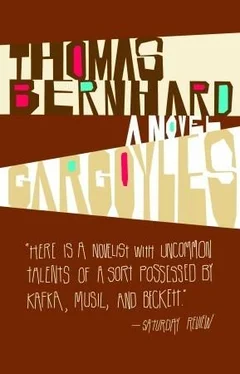My father goes to see the prince only to treat him for his insomnia, I thought, without doing anything about his real illness, without, as became more and more evident to me while we walked back and forth along the outer wall of the castle, doing anything about his madness. For suddenly I saw quite clearly that the prince is mad, which had not been evident to me while he was talking about his interviews in the morning. It had seemed then that the prince was not mad, and when he spoke about the applicants for the post of steward I had thought that the prince was anything but mad, contrary to my father’s remarks, for my father in the past had always called the prince mad. But now, as we walked faster and faster on the outer walls of the castle, I saw that the prince is actually mad.
The prince said: “The difficulty that morning, Doctor, the morning after the play, was for me this: From the moment I entered the library, saw my relatives sitting on the floor, and became aware that I must lead the discussion, must deliver a lecture, I knew that now I could no longer turn back. Now I can no longer return to my thinking, isolated as it is in my thousands of principles. I cannot simply return to my own brain. I must think aloud , must publicly establish clarity about so completely linear a matter as the problem of the antibody in nature. For it is linear, even though it is highly complicated and possibly insoluble. But along with this, Doctor, I must, as an artificial human sacrifice, balance upon a rope stretched across the entire world of the mind, across all sciences and arts, causes and effects, must pass through past and future millennia, through all the innumerable concepts of nature, with my brain presumably already far out in the universal atmosphere, and must move, balancing on my rope, toward a goal lying in uttermost darkness, a goal from which an icy chill already wafted toward me.”
We stood still.
“Such a night as the night after the play, the play was good, Doctor, it was a very good play,” the prince said, “such a tranquil night, this calm before the flood, Doctor (because of the play), one of those quiet nights which have become very rare in Hochgobernitz — you can imagine how rare these quiet nights have become in Hochgobernitz since my son has been gone — because the quiet is perfect in Hochgobernitz, because it is really all there is, there is not quiet any more.… There simply is no more quiet, no peace, no tranquility in Hochgobernitz. That night and that cold morning among us and among the books, in this icy cold daybreak atmosphere in which feelings freely are transmuted into thoughts and thoughts freely transmuted into feelings, and that is the ideal magic suddenly to be together and find one another bearable — that night, in which the self-destructive and self-disintegrating elements of the family were so cleverly muted, whether from weariness after the play or from madness before the dawn, or from madness and weariness after the play and before the dawn, so that suddenly in truth everything was able to exist and everything was justified in existing — imagine, suddenly everybody in the house felt the prevailing quiet in the house merely as a quiet prevailing in the house; the dreadfulness of it, the uncanniness of it, had suddenly been taken away. A suddenly uninstrumental society constituted directly for evil, quite in the nature of this house, a society in which a day shaken by the play was transformed from philosophical and unbearable to nonphilosophical and bearable (perhaps a brilliant compound!). On this morning in which the autumn for the first time became palpable in me, in me and, differently, in the others — we suddenly were able to look within ourselves into this year’s autumn (each of us into his own autumn), look in because of our excitement before the play and during the play, look into the tranquility of the autumn after the play, by means of our inner geometry look into the perishing of outer nature.”
On the morning after the play, with all of them assembled in the library—“except for my son nearly all the members of the family were assembled there,” the prince said, “all of them,” he repeated, and added that for many years he had not observed all of them assembled in Hochgobernitz — on that morning after the play he had delivered a “dissecting lecture,” he said. “They all sit there and listen to what I have to say about nature, and hear about the concept of nature and the concept of the antibody in nature, about the antibody nature concept, and I suddenly find myself looking into my family, into a monstrously large, monstrously outmoded Hochgobernitz, into a horrifying history growing increasingly sinister as it recedes back toward its origins, into a ghastly stench of generations, into a more and more stinking art of generations, artificiality of generations, into a labyrinth of dead horror stories under the Saurau name, from which from time to time I actually keep hearing cries of horror, Doctor, I actually hear cries of horror coming up out of the labyrinth of my family, the belated cries of horror of those who died before me.… Yes,” the prince said, “my son doesn’t write to me, my son is silent, my son studies silently in England, my silently studying son in England. He writes no letters of truth.”
And a few steps farther on the prince said: “The flood is costing me one and a half millions. A flood in the millions. But,” he said, reverting to the morning after the play, “as I stood there among my people, among those who had remained with me in Hochgobernitz, and as I explained everything to them, but chiefly to this Pole with the highly intelligent face, explained nature, and explained the nature of explanation, for all explanation must be explained,” the prince said, “that’s an ancient, necessary process, well then, as I was attempting to explain and throw light on the concept of nature, the twilight of dawn helps me enormously, the sharpness of the air — as I was talking I look into the faces of my sisters and my daughters — in this autumnal cold one suddenly sees very acutely, Doctor — and I see them all together, I also see my son, my absent son, Doctor, see them all together through myself, and a monstrous constellation dawns on me, possibly the one concept that is sheer horror in itself: I am the father!”
The prince said: “I see all of them as an incredibly differentiated proto-reality, this proto-reality which comes from me and from which I come — and in my brain there is the din of the noises.”
Far off, down in the valley, as if in a marionette theater worked from below, we saw laborers on a wooden bridge obeying an invisible foreman, and in the sudden chill in the air we heard a rapidly accelerating din of noises rising up through the woods.
The prince said: “I have the impression that it would be natural for the world to fly apart at any moment. Or is it that nature must destroy herself?” he said. “This process is always one that proceeds from within and completes itself outwardly. When I come to, am forced to, this observation, this view, because I apparently have an organism geared only for this observation, this view — when I come to it, I have the feeling that the time has arrived — at first it is only a crumbling, cracks, tears, a rending and crumbling!.. This time can go on for centuries, of course, centuries behind me, centuries before me. Millennia. But what astounds me,” the prince said, “is not the fact that these noises have been in my brain, that these noises are always there, have always been, always will be, but the horrible fact that no human being with whom I have ever come in contact — and, my dear Doctor, I have come in contact with so many people, with so many characters that if you saw them all in a heap in front of you your whole world would instantly collapse, for I’ve had so tremendously large a selection of humanity at my disposal and at certain times have associated every day with all possible characters and mentalities — but what astounds me, I say, is that no person, not a single brain, has ever taken notice of these noises or ever will. The fact that this is so is not so shocking, only that I alone am the one person, that my brain alone is the one brain, which is forced to note the frightfulness, the deadliness! Everyone around me — and it is always from myself, from my brain as a kind of thinking Hochgobernitz, so to speak, from my immediate surroundings, that I draw conclusions about the whole, about the whole world in which at any rate the whole of humanity has room — everyone around me has a numbing incapacity for perception, incapacity for observation, incapacity for receptivity.… To me this fact is deadly, it is a deadly fact to me that I am alone in this fact, that I am alone in this fact . This enormous landslide!” the prince cried out, and repeated several times: “This enormous landslide!”
Читать дальше












